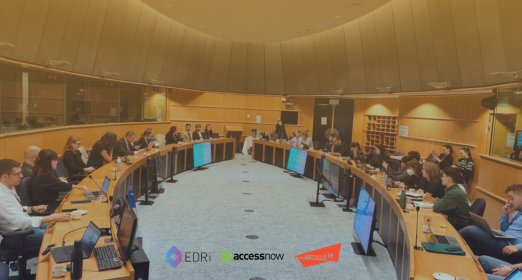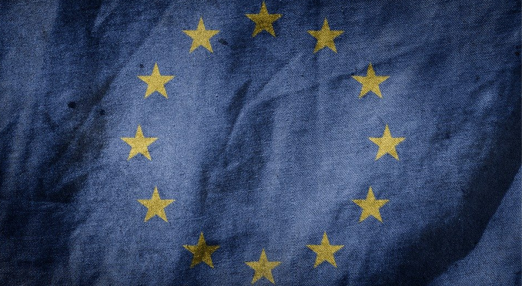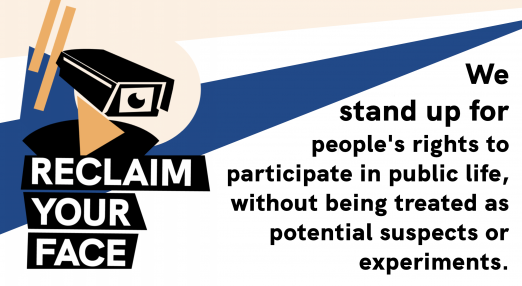article 19
Filter by...
-

EDRi and members take EU decision-makers through 20 years of digital policy
This September, EDRi, Access Now and ARTICLE 19 took Parliamentarians through a rollercoaster ride of all things digital policy in the European Union. From the early internet and initial experiments in platform regulation, through more recent regulatory innovations, and finally to questions of security and surveillance, we shared a digital rights perspective of the good, the bad and the ugly of digital policy in the EU.
Read more
-

The new EU Commission must address information power
Ahead of the European Parliament elections, ARTICLE 19 shares its recommendations for the new European Commission, urging it to strive for a more open information environment across the EU.
Read more
-

The European Media Freedom Act: a unique opportunity to safeguard Europe’s media and democratic values
Media independence, freedom and plurality are under pressure in the EU. The upcoming European Media Freedom Act (EMFA) is a unique opportunity to protect Europe’s media and, by ensuring a diverse information ecosystem, also safeguarding EU democratic values.
Read more
-

UK: European Court decision in Big Brother Watch case does not go far enough to protect free expression and privacy
The finding of a violation is testimony to the doggedness of civil society in holding the UK government to account in the wake of the Snowden revelations about mass surveillance programmes. EDRI's member ARTICLE 19 welcomes the decision of the European Court of Human Rights (European Court) in Big Brother and others vs the UK, which ruled that the United Kingdom’s bulk interception of communications violated the right to privacy and failed to protect journalists in breach of the right to freedom of expression.
Read more
-

At a glance: Does the EU Digital Services Act protect freedom of expression?
The Digital Services Act is in many ways an ambitious piece of legislation that seeks to make ‘Big Tech’ accountable to public authorities through new significant transparency and due diligence obligations. It also contains many provisions that could help protect users’ fundamental rights. Whether it will be successful at protecting freedom of expression from undue restrictions or reining in the power of Big Tech rather than cementing it, is, however, questionable. EDRi's member ARTICLE 19 share its first thoughts on why.
Read more
-

Campaign “Reclaim Your Face” calls for a Ban on Biometric Mass Surveillance
Civil society across Europe launches the “Reclaim Your Face” campaign, demanding that local and national authorities listen to their communities about the serious risks of using facial recognition and other biometric technologies in public spaces. The newly formed coalition calls to ban biometric mass surveillance, in reaction to the rapid and secretive roll out of invasive and unlawful technologies by police forces and local authorities in many European countries.
Read more
-

Web browser privacy: ARTICLE 19 welcomes initiatives to protect users
There are widespread web tracking practices that undermine users’ human rights. However, safeguards against web tracking can and are being deployed by various service providers. EDRi member ARTICLE 19, and more generally EDRi as a whole, support these initiatives to protect user privacy and anonymity as part of a wider shift toward a more rights-respecting sector.
Read more
-

The digital rights of LGBTQ+ people: When technology reinforces societal oppressions
Online surveillance and censorship impact everyone’s rights, and particularly those of already marginalised groups such as lesbian, gay, bisexual, transgender and queer and others (LGBTQ+) people. The use of new technologies usually reinforces existing societal biases, making those communities particularly prone to discrimination and security threats. As a follow-up to Pride Month, here is an […]
Read more
-

New standards for networking challenge regulators & digital rights
On 17 October, the European body of telecommunications regulators (BEREC) organised a stakeholder meeting in Brussels, inviting industry, consumers, regulators and citizens’ rights groups to reflect on the BEREC Work Programme 2019.
Read more
-

US companies to implement better privacy for website browsing
Important changes are underway for web users, as browser manufacturers are set to put domain name system (DNS) look ups in the hands of more predictable, trusted and transparent sources.
Read more
-

Internet protocol community has a new tool to respect human rights
EDRi member Article 19 welcomes the Internet Research Task Force’s new “Research into Human Rights Considerations” as a much needed tool for the internet protocol community to respect human rights.
Read more
-

UK: Emergency legislation on data retention pushed through
Faced with a lawsuit from NGOs challenging the legality of its data retention regulations (which are based on the data retention directive the European Court of Justice found unlawful in April 2014), the UK government brought in emergency legislation, a Data Retention and Investigatory Powers Bill (DRIP), to not only declare data retention to be […]
Read more
